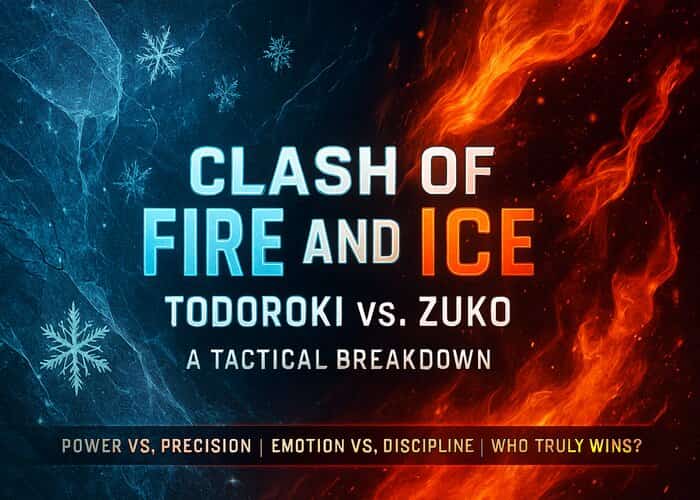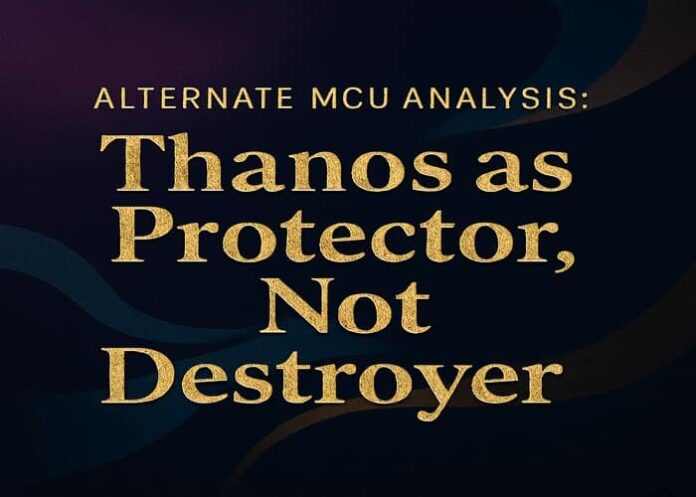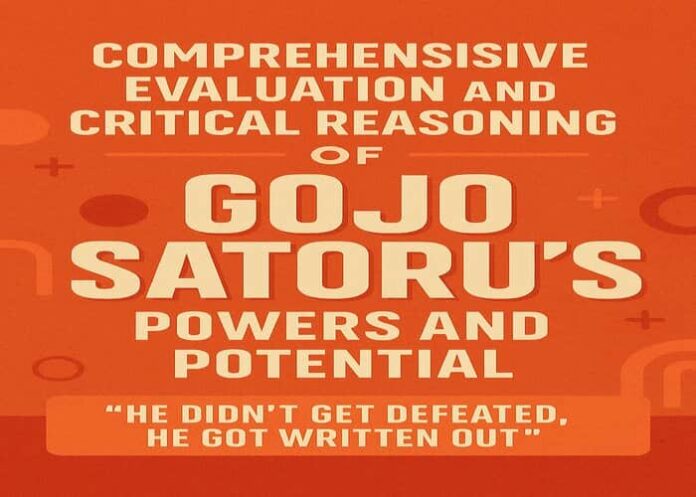
Two fan favorites. Two different worlds. Both carry fire in their hands and a mountain of expectations on their shoulders. On one side, Shoto Todoroki from My Hero Academia,a walking balance of extremes. On the other, Prince Zuko from Avatar: The Last Airbender,the scarred warrior who turned pain into wisdom.
This isn’t a “who’s cooler” poll. It’s a measured look at where each one thrives, where they stumble, and how their fighting philosophies compare.
Where Todoroki Holds the Edge
Raw Elemental Power
Todoroki can unleash large-scale attacks that completely alter the battlefield. His ice walls and wide-range blasts can immobilize multiple enemies at once, something Zuko doesn’t match in sheer scale.
Dual-Element Versatility
Fire and ice together give Todoroki options Zuko simply doesn’t have. He can counter fire with ice while keeping fire in reserve.
Thermal Regulation & Endurance
Todoroki’s Quirk actively balances his body, letting him keep fighting without overheating or freezing. Zuko relies on stamina and discipline, but Todoroki’s self-regulation is a clear advantage.
Battlefield Control
Shoto doesn’t just use the terrain,he changes it. Rivers become frozen highways, walls appear out of nowhere, and the fight is suddenly on his terms.
Range & Versatility of Attacks
His ice and fire let him fight at long range, set up defenses, and force enemies into bad positions. Zuko tends to work better at mid-range.
Team Synergy & Support
Shoto can protect allies, block attacks, or even create ramps and paths. He brings direct benefits to team combat that Zuko doesn’t always match.
Environmental Flexibility
Todoroki’s Quirk allows him to mitigate temperature extremes, though his ice side is naturally disadvantaged in hot environments. Zuko’s firebending thrives in heat and sunlight, giving him a more consistent edge in warm climates.
Where Zuko Holds the Edge
Hand-to-Hand Combat & Martial Skill
Even without fire, Zuko is a skilled swordsman and martial artist. Todoroki relies heavily on his Quirk.
Defensive Capabilities
Zuko’s lightning redirection and precise fire barriers give him defensive options Shoto can’t replicate.
Stealth & Subtlety
Zuko’s Blue Spirit persona proves he can fight from the shadows. Todoroki’s large-scale attacks make subtlety difficult.
Mental Fortitude & Adaptability
Zuko’s journey shaped his resilience. He can stay calm under pressure and adapt in chaotic situations. Todoroki is strong but still works through inner conflict.
Discipline & Precision
Zuko’s firebending reflects martial discipline, with every movement calculated. Shoto leans more on overwhelming power.
Combat Experience
Zuko has fought wars, duels, and guerrilla battles. Shoto’s experience, while impressive for his age, comes mostly from structured missions.
Spiritual Depth
Zuko’s firebending draws on philosophy and life energy. Shoto’s Quirk is genetic and practical, but not spiritual.
Emotional Resilience
Zuko survived exile, betrayal, and years of hardship. Todoroki is tough, but still learning to fully separate from his family trauma.
Recovery & Injury Resistance
Zuko’s body is scarred and hardened from years of combat. Shoto risks frostbite or overheating with prolonged Quirk use.
🤝 Shared Traits
Adaptability: Shoto shapes the environment, Zuko adapts within it.
Strategic Intelligence: Shoto is stronger at big-picture control, Zuko excels in tactical precision.
Psychological Warfare: Shoto intimidates with overwhelming spectacle, Zuko unsettles with stealth and presence.
🧘 Combat Philosophy
Zuko: Discipline, tradition, and inner balance.
Todoroki: Overwhelm, adapt, and react in the moment.
🧮 Final Scoreboard
| Category | Winner |
|---|---|
| Raw Elemental Power | Shoto |
| Dual-Element Versatility | Shoto |
| Thermal Regulation & Endurance | Shoto |
| Battlefield Control | Shoto |
| Range & Versatility | Shoto |
| Team Synergy & Support | Shoto |
| Environmental Flexibility | Shoto |
| Hand-to-Hand Combat | Zuko |
| Defensive Capabilities | Zuko |
| Stealth & Subtlety | Zuko |
| Mental Fortitude & Adaptability | Zuko |
| Discipline & Precision | Zuko |
| Combat Experience | Zuko |
| Spiritual Depth | Zuko |
| Emotional Resilience | Zuko |
| Recovery & Injury Resistance | Zuko |
| Psychological Warfare | Even |
| Combat Philosophy | Zuko |
Final Tally:
Shoto: 7 wins
Zuko: 10 wins
Tie: 1
🎯 The Verdict
If you want large-scale elemental control and raw power, Todoroki delivers. He dominates when the fight is about area coverage and team strategy. But in a duel, where discipline, experience, and resilience matter most, Zuko edges ahead.
The scarred prince claims the narrow victory.
Want to see how this matchup plays out in a stealth mission, a packed tournament arena, or a volcanic battlefield? That’s a whole other story.
Key Points
- Zuko’s firebending is spiritual at its core Inspired by dragons and life energy it’s not just flashy blasts of heat it’s philosophy with flames
- Shoto Todoroki keeps himself from overheating or freezing by balancing fire and ice on the fly Imagine having built in air conditioning and a space heater at the same time
- Zuko is a martial artist first and a firebender second He can throw hands and duel with swords without bending at all
- Shoto has no problem covering half the arena in ice or launching walls of flame He’s basically his own demolition team
- Zuko’s lightning redirection move taught by Uncle Iroh is one of the most dangerous counters in animation history He doesn’t generate lightning but he can take it and send it right back like a human conductor
- Shoto can create steam by clashing fire and ice together Instant smoke screen and visibility hack clever way to confuse opponents
- Zuko started as a hot headed teenager screaming about honor and ended as a calm strategic leader with enough wisdom to sit in a philosophy class and pass without notes
- Shoto’s training is structured and heroic school approved Zuko’s training is surviving ambushes betrayals and a literal war Guess who has the grittier resume
- Both wrestle with family drama so intense it makes your problems with group projects look tiny This personal baggage shapes their fighting styles in ways that make battles as emotional as they are physical
- In the end both prove that raw power without emotional growth is half baked Strength really shows when it’s tempered by awareness and maturity
Fun Facts
- Shoto’s ice powers are inspired by Hokkaido’s harsh winters, reflecting Japan’s northern climate.
- Zuko’s Blue Spirit mask draws from East Asian theater traditions like Noh and Chinese opera.
- Shoto’s design embodies yin and yang,visually and thematically balancing opposing forces.
- Dante Basco’s improvisation shaped Zuko’s personality, though the Blue Spirit himself is silent.
- Shoto’s scar symbolizes trauma and resilience, echoing real psychological healing.
- Zuko’s firebending is based on Northern Shaolin kung fu, known for powerful, precise strikes.
- Shoto’s Quirk mimics cryo and pyro effects used in special effects industries.
- Zuko’s redemption arc is hailed as one of animation’s finest character journeys.
- Shoto’s ice formations resemble real-world glaciers and snowflakes.
- Dragons are revered as the original firebenders, embodying balance and spiritual depth.
- Azula’s blue flames reflect real physics,hotter flames burn blue, like in butane torches.
- Shoto’s fire and ice represent his parents’ clashing personalities and emotional legacy.
- Early concept art gave Zuko red hair, later changed to black to reflect Asian heritage.
- Shoto’s steam technique mirrors real chemistry,rapid heat meeting cold creates mist.
- Dante Basco’s natural delivery helped define Zuko’s emotional depth and charm.
- Shoto’s training under Endeavor mirrors real-world pressure dynamics in elite sports families.
- Zuko’s swordplay blends real martial arts with imaginative bending choreography.
- Shoto’s internal balance reflects biological thermoregulation,maintaining core temperature.
- Zuko’s honor struggle echoes samurai values and warrior codes from classical literature.
- Both Zuko and Shoto show that true strength comes from mastering both power and personal growth.

